Distinguished Teaching Award
Nominate a Distinguished Teacher
Faculty are informed of their nomination at the end of the nomination period which is Dec. 6, 2024.
- Up to 25 semi-finalists will be selected to submit a portfolio and will notified by the end of Autumn semester. See the Portfolio Criteria.
- See examples of noteworthy portfolio qualities.
- Winners receive a one-time cash bonus of $3,000, a reserved parking space for the semester of their choice and release time to serve on the next DTA selection committee.
2022-23 Distinguished Teachers
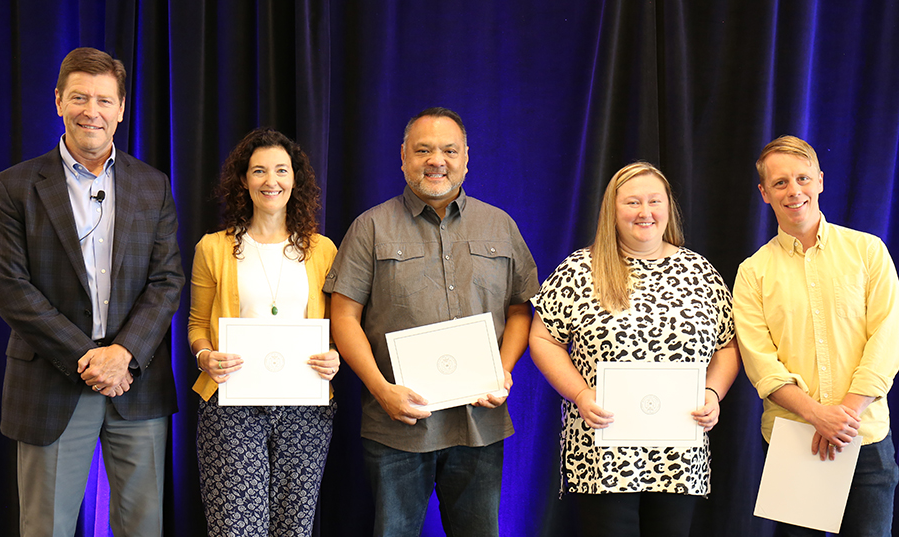
Above, left to right: President Harrison, Katherine Hammond, Ron Elizaga, Angela Howard, and Nick Shay.
Distinguished Teacher Award: Katherine Hammond, Humanities instructor with nearly three years of service; Ron Elizaga, Psychology & Education professor with nearly 14 years of service; Angela Howard, Biological & Physical Sciences associate professor with 12 years of service; and Nick Shay, Mathematics associate professor with five years of service.
Each year Columbus State recognizes up to four faculty for the Distinguished Teaching Award. Award winners are nominated by students and reviewed by a committee of peers. Selections are based on evidence of excellence in teaching. Criteria for selection include:
- Knowledge of and enthusiasm for the subject matter
- Establishment of good rapport with students
- Course organization and course content
- The use of a variety of instructional methods and materials in support of student learning
Recipients are honored during the Employee Celebration of Excellence each spring. They receive a cash award, medallion and certificate, and release time to review nominees the following year.
Guidance for Faculty
- If you are nominated, and wish to continue pursuing the DTA award, you must submit a 1-2 page teaching philosophy statement. For a guide, you can use the Tenure and Promotion statement guidelines (see page 14).
- Up to 25 semi-finalists will be selected to submit a portfolio and will notified by the end of Autumn semester. See the Portfolio Criteria.See examples of noteworthy portfolio qualities.
- Finalists will be observed by committee members over the second half of spring semester
- Four winners will be selected and recognized at the annual Quality and Team Awards Ceremony.
See complete eligibility and process guidelines.
About the Award Process
- Nominations are accepted from students, employees and alumni at any time during the year.
- The DTA selection committee consists of the previous year's winners plus one academic administrator.
- Winners receive a one-time cash bonus of $3,000, a reserved parking space for the semester of their choice and release time to serve on the next DTA selection committee.
Past Winners
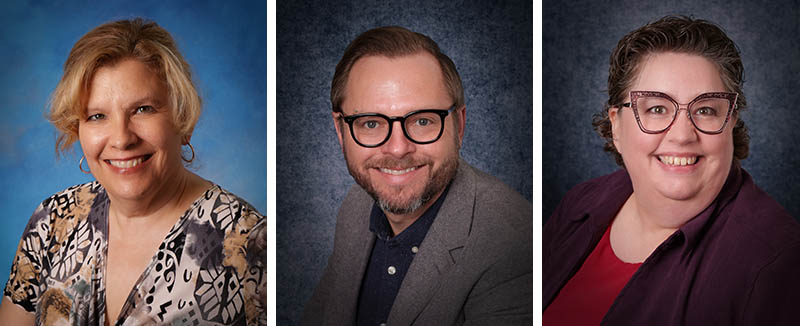
The 2022-23 Distinguished Teaching Award winners are from left to right: Martha Crone, Instructor, Social Sciences; Matthew Saelzler, Assistant Professor, Biological & Physical Sciences; Stefanie Day, Adjunct Professor, Psychology & Education.
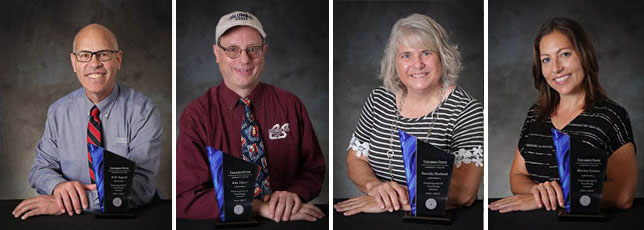
The 2021-22 Distinguished Teaching Award winners are, from left to right: Erik Aagard, Instructor, Engineering & Transportation Technologies; Don Durst, Adjunct Instructor, Design, Construction & Skilled Trades; Dorothy Husband, Adjunct Instructor, Mathematics; Marian Lerner, Adjunct Instructor, Art Media & Design.
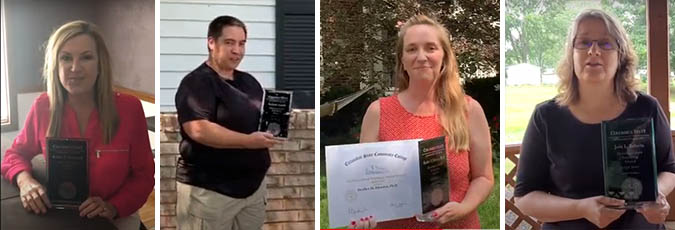
Bobbie Stonerock, Justice/Safety/Legal Studies
Bobbie is a passionate, knowledgeable, and gifted attorney and instructor. Bobbie organized many individual student appointments and her enthusiasm for legal studies was infectious. Her virtual class was a productive, engaging, and effective discussion of several legal issues. Bobbie had an excellent rapport with her students; it was clear they appreciated the extensive time she put into providing them with real-life, applicable examples versus stale information from dated resources.
Bobbie provided realistic scenarios and essential paralegal tips for them as they move beyond the classroom and into their careers. You could tell Bobbie kept in touch with her students long after they finished her class and cherished the relationships that began with them during their time at Columbus State. Bobbie tailors every class, every semester to her specific group of students and what is happening in the real world. Bobbie goes above and beyond getting to know her students. She greets every student by name every class meeting and touches base with every student at every class to understand what they have going on and how the class fits into their lives.
Felicia Smith, Mathematics
Felicia is a patient, kind and dedicated instructor who takes time to make sure every
student feels confident and comfortable about course content before moving on. Felicia
uses surveys and real-time practice problems, particularly with virtual instruction
where it is easy for students to feel disconnected. The surveys assessed students'
potential roadblocks to learning math; she truly wanted to learn how each student
approached learning math and was willing to help them in any way she could.
Felicia has such an approachable and welcoming approach to teaching. Students have
so many ways to practice and master math concepts through a mix of video and interactive
elements of the course. Felicia even incorporates movies that center around math and
engage her students in service projects. Felicia makes math fun! She understands how
students struggle and how to explain the concepts in a way they will understand.
Heather Johnston, Psychology & Education
Heather's passion for the subject matter was evident from her introduction video, throughout every element of the course, and culminating with a goodbye video at the end of the semester. It was clear Heather was deliberate in making her students feel as comfortable and confident as possible, that students were in a safe space in her course, and she cared for them well beyond just being their online instructor.
Heather went above and beyond to recognize the diverse personal challenges students were facing during the pandemic and was committed to meeting their most basic needs as much as their academic ones. Heather truly cares about the well-being of her students, not just their performance in her courses. Heather's enthusiasm for her courses has never wavered; she goes the extra mile to make sure her students are learning.
Jane Roberts, Allied Health
Jane's course is designed around active and collaborative activities to help her students succeed. Her use of interactive discussion boards and creation of simulated electronic health record labs were excellent examples of her use of evolving and impactful technology. Jane uses a variety of alternative assessments that allow students to demonstrate their mastery of course material beyond performance on a standard exam.
Students created virtual workbooks that involve a variety of interactive assignments and allow them to study with their peers, even in a virtual learning environment. Jane uses Socrative quizzes for each course meeting, allowing students to interact in a low-stakes manner and ensure they are understanding the course content. Jane has thought critically not only about her courses, but also how she can best-promote learning in her classes. Her syllabus organization matches her Blackboard organization, resulting in easy understanding for students to know what they need to do each week.
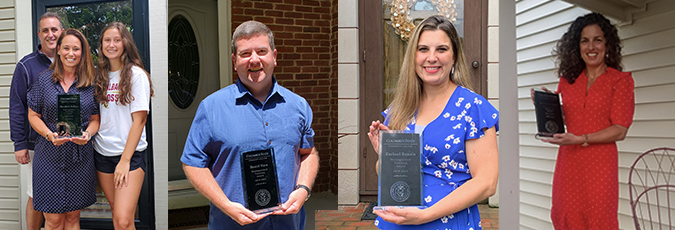
Merideth Sellars - Associate Professor, Anatomy & Physiology/Human Biology
Columbus State employee for 16 years
Nominated by Rami Jahshan who writes, "One of a kind. The best. Able to take information and knowledge and teach it in a fun and engaging way to students. Never fails to leave any student behind and always takes the extra mile to explain concepts and reasoning."
Merideth is Compassionate, Optimistic, and Dedicated!
Daniel Hare - Associate Professor, Criminal Justice
Columbus State employee for 9 years
Nominated by Christa Pargeon who writes, "Professor Hare teaches his classroom with such detail and enthusiasm it draws his students into the subject matter. The attention he gives to demonstrating what a great detective is and how to properly investigate a scene is engaging."
Dan is Student-Centered, Positive, and Committed!
Rachael Romain - Associate Professor, Biological and
Physical Sciences
Columbus State employee for 12 years
Nominated by Lyanna Seeholtz who writes, "She wants everyone to do well and will make herself available no matter what. I think she lives, eats, breathes desire for her students to be successful."
Rachael is Dedicated, Accountable, and Passionate!
Jessica Lickeri - Associate Professor, Mathematics
Columbus State employee for 14 years
Nominated by Madeline Makuch who writes, "She is always happy to help and always smiling when she's in the room. She cheers for students whenever they transition to the next course, and continued encouraging me and telling me that I did a great job when I passed my final. She is incredibly helpful, comforting, and comfortable to be around."
Jessica is Energetic, Enthusiastic, and Optimistic!
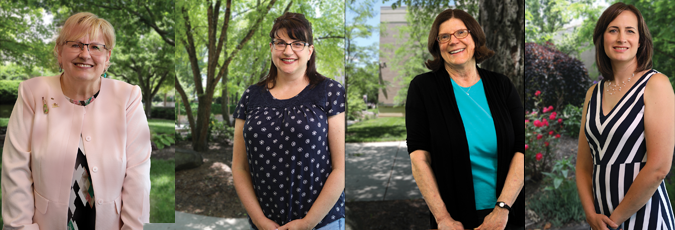
The 2018 Distinguished Teaching Award winners are, from left to right: Charla Fraley, Associate Professor, Business Management; Sharon Stickley, Assistant Professor, Biological & Physical Sciences; Margaret Owens, Associate Professor, Construction Management Design, Construction and Trades; Jennifer Mauck, Assistant Professor, Nursing.
Charla Fraley, Associate Professor, Business Management
Charla says, in her words, “Setting the table is as an important as the food.” She says that building the classroom community and setting the tone for the time spent with students builds a foundation. She works to transform classroom engagement into a passion for lifelong learning and growth.
She sometimes breaks up classroom time from lecturing to use videos or team-based activities and collaborative learning. She also uses field trips when possible to extend success and learning into real-world situations and events.
Multiple class observers documented an outstanding presentation style. One said, “Charla employed varied activities pulling students into the conversation about the content and provided them with many activities with which to engage in learning.
A student, who had just been accepted into a program at Ohio State, wrote to Charla, saying, “I can’t thank you enough for all of your help and support. It can sometimes be difficult to connect with faculty so I especially appreciate you making time for me.”
Jennifer Mauck, Assistant Professor, Nursing
Jennifer says that critical thinking is imperative in nursing as it allows nurses to collect, analyze, and prioritize information to determine effective interventions. As an educator, she says she recognizes that individual learning needs differ among students.
To ensure quality and effectiveness, she dedicates time toward ensuring her classes remain up-to-date and meet the needs of each student.
One student said, “It is evident that Jennifer cares about each student and our success. I feel most comfortable with this instructor. She acknowledges our strengths while pushing us to improve on our weaknesses.
A faculty evaluator said, “Jennifer is comfortable with her teaching style which is evident by the way students are engaged in the classroom. This was one of the best class observations I have had the privilege to report information.”
Margaret Owens, Associate Professor, Construction Management Design, Construction and Trades
Margaret says that “teaching is an opportunity to change the world one student at a time.” In that role, she says she wears many hats: instructor, advisor, mentor, and friend.
Part of her philosophy includes a belief that the most meaningful learning experiences are those where she can help guide the students to self-discovery of new knowledge.
An observer said, “Of all of the faculty that I have observed over the past 18 months, Margaret’s classes appear to be the most stress-free and inviting. It makes me wish I could sit through the rest of her class sessions.”
A student wrote, “The different teaching strategies mixing lectures, PowerPoints,
in-class exercises including role-playing situations, made it a very effective way
to learn this material.”
Sharon Stickley, Assistant Professor, Biological & Physical Sciences
Sharon’s teaching philosophy, in part, is that the learning process must be interactive and dynamic between the student and instructor – both in the classroom and out.
She believes that there are two main challenges to teaching organic chemistry: the novelty of the subject to the students and the difficulty of the subject. She reminds students that they are learning a new language as well as a science and that the key to success is practice, practice, practice.
A peer evaluator said Sharon understood that students will not understand the concepts until they saw an example to apply it to, and had a chance to try an example on their own. Another said she kept the students engaged and helped them think critically about the material.
A student said, “I like that she was able to explain one topic in multiple ways so
that we can all understand the subject.” Another student said that “she made us learn
things that then gave us the ability to do things on our own.”
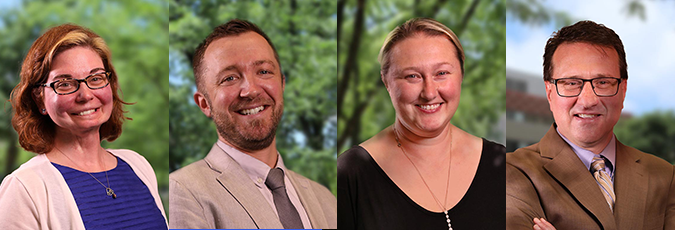
The 2017 Distinguished Teaching Award winners are, from left to right: Jeanette Ferguson, Ph.D., Assistant Professor, Biological & Physical Sciences; Eric Kenz, Assistant Professor, Biological & Physical Sciences; Angela Howard, Ph.D., Instructor, Biological & Physical Sciences; and Jeff Bates, Ph.D., Professor, Design, Construction & Trades.
Jeff Bates, Ph.D., Professor, Design, Construction & Trades
Most students in the Environmental Science, Safety and Health program will take between five and seven classes with Jeff Bates. Some enter with strong scientific or technical background, but many do not. Bates is responsible for preparing them all to enter the field, and it’s a responsibility he takes seriously.
For Bates, imparting technical knowledge is only part of the job. He also seeks to push students out of their comfort zones. That could mean leading students in a hands-on activity out in the field or pushing them to expand their math skills. The goal is to provide students with the classroom, laboratory and field experiences that will prepare them for a career in Environmental Science, Safety and Health. Bates says he enjoys engaging with students through experiential learning and seeing them evolve as individuals during their time at Columbus State.
His student nominator wrote that Bates is “a true master in the field of environmental science.” His enthusiasm for the subject is contagious, and he does everything necessary to create an environment where his students can succeed.
Jeanette Ferguson, Ph.D., Assistant Professor, Biological & Physical Sciences
Jeanette Ferguson believes it’s important to foster three things in the classroom: communication, collaboration, and community.
Ferguson says that all too often, students apologize for asking questions in class. She tells her students that questions are the basis of all new discoveries. The collaboration in her classroom happens through group quizzes, laboratory challenges, case study analysis and more. Ferguson believes that that true test of whether you understand a concept is if you can teach it to another person.
And last, but certainly not least, Ferguson works hard to build a sense of community in her classes. During the first week of class, she asks students to participate in an online discussion board where they share their majors, future goals and concerns about the course. She’ll then summarize the info to show her students just how much they have in common!
In one of her classes, the group bonded so well, they decided to pay tribute to one of Ferguson’s favorite catchphrases: “If it looks like a duck and quacks like a duck, tell me it’s a duck.” She does this to remind students NOT to overthink observations in the lab. Her students took it to heart and presented her with a flock of rubber duckies with personal messages at the end of the semester.
Angela Howard, Ph.D., Instructor, Biological & Physical Sciences
Classroom observers have noted that Angela Howard has a way of connecting with her
students and putting them at ease – which is no easy feat in a chemistry class. One
of her former students wrote that she was apprehensive to take an advanced science
class like organic chemistry, but Howard went above and beyond to help her succeed.
As a result, the student proudly earned her first A in a chemistry course.
Howard strives to improve her own teaching methods, and is always seeking new ways to encourage critical thinking, collaboration, and creativity in her students. But she also knows how important it is to connect with students on a personal level.
A first-generation college student herself, Howard started her college journey as a criminal justice major. After encountering an inspirational and encouraging chemistry professor, Howard discovered her own passion for science and went on to earn a master’s degree and PhD. Howard says she encourages her students to believe in themselves and reach for their goals because she knows how influential an instructor can be.
Eric Kenz, Assistant Professor, Biological & Physical Sciences
Eric Kenz is an innovative teacher who has worked diligently to create comprehensive digital iBooks and learning videos to help teach Human Anatomy. These digital learning materials help students grasp complex material through interactive tools and removes the financial burden of buying an expensive textbook. One student noted in a course review that the visual elements and videos Kenz provided were crucial to their success. In 2017, Kenz was awarded the recognition of Apple Distinguished Educator for his work on these cutting-edge materials.
However, it’s not just his enthusiasm for new technology that makes Kenz a great teacher. He uses all the tools at his disposal to make human anatomy accessible to his students, including those registered with Accessibility Services. He also he teaches his students that human anatomy isn’t about rote memorization. Instead, he teaches them how to approach anything new and describe it with detail and accuracy.
A classroom observer wrote, “It’s no exaggeration to say that Eric is one of the most hardworking faculty members I’ve ever known. He cares a great deal about his teaching and his students.”
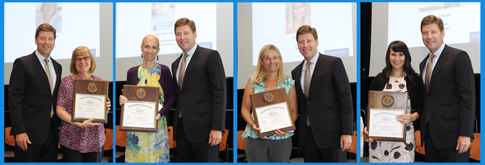
Elizabeth Betzel, Amy DeLorenzo, Kelli Nowlin and Nicole Brandt.
Nicole Brandt, Ph.D., Instructor in Psychology
Nicole Brandt’s teaching philosophy is influenced by the broad diversity of the students
at Columbus State. She recognizes that in order to make an impact on her students’
lives and help them reach their academic goals, she must identify and teach them within
their personal developmental framework. Dr. Brandt loves the challenge of teaching
students who struggle academically, or have a disability, while at the same time stimulating
high-achieving students.
In nominating her, one of her students wrote that she believed Dr. Brandt did everything
in her power to make sure her students were all on track and in good academic standing
throughout the semester. The student wrote that Dr. Brandt’s lecture style is “modern
day,” and that she had a great way of relating to her students.
Dr. Brandt achieves this rapport by allowing her students to become conscientious
consumers of knowledge, and to think independently, not believing everything they
read in books, articles, or on social media.
Nicole Brandt says her most satisfying moments as a teacher are when a student takes
a second class from her, when she hears from a new student that her class was recommended,
or when she receives an email from a former student with a psychology-related story
or article. She hopes to provide her students with confidence in their ability to
succeed in college, no matter what subject area they choose to pursue.
Amy DeLorenzo, Assistant Professor in the Interpreter Education Program
According to Amy DeLorenzo, American Sign Language interpreters accompany people through
the most intimate moments of their lives, and that immense responsibility is the foundation
of her teaching. She notes that interpreting is a profession that navigates the complexities
of humanity—one that can impact people’s lives and livelihoods. She encourages discussions
in her classes that help her students to explore their own assumptions about a group
to which they do not belong—the Deaf community.
Her student nominator wrote that DeLorenzo flows with an abundance of passion and
excitement for everything she teaches. She teaches diligently, thoughtfully, and with
lots of excitement. The student writes that Amy is also “wildly creative,” and that
it blows her mind how she can come up with new and innovative ways to teach.
In her nomination, the student described her favorite project, in which the students
completed a cultural humility project for the Interpreting Ethics class. The student
emphasized how DeLorenzo makes sure her students are real-world educated, as well
as classroom educated.
A classroom observer wrote that DeLorenzo establishes an environment that encourages
all students to participate, be wrong, be corrected, and support their peers—a complex
challenge that Amy does so well!
Kelli Nowlin, Instructor in English
In teaching her English Composition classes, Kelli Nowlin acknowledges that she is
NOT a lecturer. She realizes that this goes against the historically preferred method
in higher education, but she prefers to focus on a more hands-on approach, including
small-group discussion, critical thinking, and reflection. She uses videos, blogs
and podcasts, news articles, short stories, advertising and social media to bring
real-world applications to the classroom.
On the first day of class she asks her students to write a commercial about themselves,
as an icebreaker. On the last day of class, they present a complete portfolio of their
work.
A classroom observer writes that Nowlin obviously spends time outside of class researching
ways to engage students, and seamlessly incorporates them into the course as enhancements.
Her student nominator writes that that Kelli’s classes all flow together perfectly
and that she totally understand the subject because of her teaching. The student says
she has never had a class like this—that made her want to learn more.
This student’s assessment of her would please Nowlin greatly, because she believes
a teacher shouldn’t be judged based on how much her students like her, how engaging
she is, or even how knowledgeable she is—she should be evaluated on how well her students
learn. She is constantly assessing her own teaching so that she can help her students
meet the challenges of our changing world.
Elizabeth Betzel, Professor of Mathematics
Elizabeth Betzel has been teaching math since she was nine years old and her fourth-grade
teacher gave her a “new math” textbook to study. She was soon assigned to help her
classmates who were struggling, and as Betzel explains, she immediately became smitten
with teaching and with math!
Fast forward some 50 years and Betzel remains on the forefront of active learning.
She has combined teaching technologies such as distance learning, video lectures and
collaborative learning, with the personal contribution she offers in the traditional
classroom. She has experimented with flipping her classes—having the online students
collaborate in groups through GoogleChat, and having her in-class students complete
assignments at home using videos and guided notes.
What she has realized over the years is that students learn most when they are doing.
Her classroom has an organic overtone. It is busy, chaotic and sometimes very noisy
with students practicing what they have learned.
Her student nominator writes that Betzel is always in an upbeat mood, never gets off
track, and always stays focused. The student loves how she allows small groups to
work together to solve problems that might have stymied individuals. And she appreciates
the lectures being posted online for review.
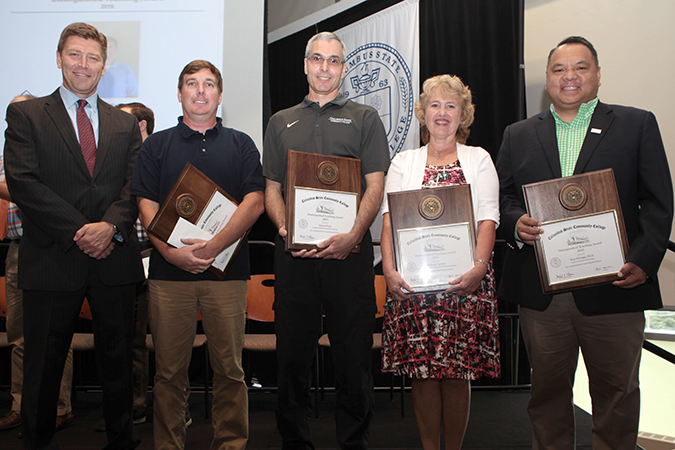
Melanie Adams M.S.
Associate Professor, Early Childhood Development and Education
Teaching has been Melanie Adams’ passion for more than 30 years. She teaches her Early
Childhood students that young children learn best in an environment that fosters community,
provides hands-on learning, accommodates multiple types of learners, and provides
specific feedback. In her own classroom, she uses the same philosophy when teaching
her adult learners.
The student who nominated Melanie for the Distinguished Teaching Award says that she teaches in a manner where learning truly comes to life through experiencing a child's perspective. The student says that Melanie’s lessons are clear, interactive, resourceful, and can be immediately implemented into any classroom. The student wrote that “In her courses, Professor Adams goes out of her way to meet you where you are in life, and she wants every student to be successful. The content makes you look forward to her classes each and every week, and you know that you are going to walk out of the room feeling better about yourself and more confident as a future educator.
Melanie brings strong verbal and written communication skills to her classroom. Her delivery style is relaxed, conversational, and includes a sense of humor. She teaches with enthusiasm and great passion for the subject of early childhood education, bringing energy and inspiration to all of her classes.
Ron Elizaga, Ph. D.
Assistant Professor, Psychology
Dr. Ron Elizaga agrees with the quote that “the average teacher explains complexity;
the gifted teacher reveals simplicity.” Ron’s goalsin his classroom are to provide
an enjoyable, yet though-provoking learning environment, to challenge his students
to be critical thinkers, and to motivate and inspire them.
In his Introduction to Psychology class, he says it’s easy for students to become overwhelmed by the amount of material, and so he takes great pains to present the information in logical, meaningful groups, or “chunks.” He uses learning strategies such as think-pair sharing and reciprocal teaching to help his students develop critical thinking skills. And he makes sure students stay engaged with his lectures by providing the PowerPoint slides in advance of class, but with certain passages missing, so that students have to fill in the blanks using their own thoughts and analysis.
The student who nominated Ron for this award said that she had never been good with
science subjects, but that Dr. Elizaga allowed her to look at psychology in a different
way, using word games, videos, animations and study guides that helped her to remember
the concepts.
Ron works hard to be a source of support for his students, and is co-founder of the
Generation One Trailblazers, and is involved in the Supplemental Instruction program,
the Active and Collaborative Learning Community, and the Instructional Success Committee.
Daniel Foor,
Assistant Professor and TechLINK Coordinator, Automotive and Applied Technologies
Although Danny Foor has worked in the automotive industry for more than 20 years,
he has only been teaching at Columbus State for four years. His chairperson feels
that he has found his “true calling” in teaching automotive technology, and his students
agree.
Danny states that he has learned to use his own challenges with Dyslexia as a teaching tool, as it helps him break down barriers in the classroom and creates an environment that encourages discussion and learning. Because the field of automotive technology has changed so dramatically over the years, as a Master Technician, Danny hopes to help mentor and develop his students and encourage their lifelong learning, creating the next generation of industry professionals.
He frequently receives 100% ratings from his students on evaluations, and his student nominator wrote that he has never missed a day of class, and is always willing to stay late or come in early to make sure everyone understands the subject being taught. The student went on to comment that Danny doesn’t have a hard time building rapport because he never responds emotionally to any student. He never show frustration, is always smiling, and is very easy to talk to, she says. He has a positive attitude and is always encouraging to those who are not confident in their skills yet as a technician, according to his student nominator.
In only four years of teaching Automotive Technology, Danny Foor has greatly contributed to the success of the TechLINK program, building relationships with more than 140 automotive employers and personally placing more than 70 of his own students into employment in Central Ohio. And just this month, Danny Foor was named New Teacher of the Year by the North American Council of Automotive Teachers.
Jonathan Kreger, M.A.
Assistant Professor, Social Sciences
Jonathan Kreger teaches political science by maximizing student interaction. He knows
that most of his students come with a general awareness of politics, and so he takes
full advantage of current events, news sources, timely videos and even comedy when
appropriate, to engage his students in the world of politics. One of his favorite
teaching methods is to use audience response devices known as “clickers” to facilitate
discussions and get a response from every student in the class.
Jonathan’s students marvel at his ability to remember each of their names, and after each collective response from the clickers, he calls on individual students to comment, or defend their response to the questions. Because most students have only partially formed views of politics, he tries to expose his students to values and ideas that may be counter to their beliefs, because this is an important aspect of the college experience. Jonathan stays involved with students outside of the classroom as well, by serving as advisor to the Political Science Club, as an honors faculty mentor, and by helping place students into political internships to further their academic and professional goals.
His student nominator said that Jonathan teaches with professionalism, clarity and excitement, and that his courses are well structured, clear, easy to understand, and interesting.
Another student wrote that “Professor Kreger is an outstanding teacher with endless knowledge of politics. As a political science major, I strive to have the knowledge and passion for politics that Professor Kreger possesses!”
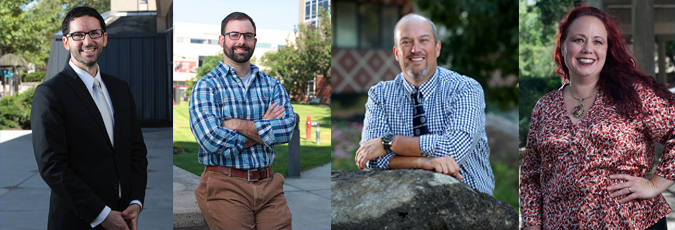
Stephen Logan
Assistant Professor in English
Stephen Logan’s philosophies about teaching English seem to be working, as his students
rave about him online and in their evaluations. Logan has two major goals in his Composition
classes—to help his students become better writers by the end of his class, and to
learn to enjoy writing. He does this by meeting each student halfway, learning their
names, their interests, and their challenges—and then giving them some control over
their writing projects by allowing them to choose topics that suit them and interest
them. His unique method of unlimited revision helps students “work up” to an A grade
if they really want to earn it. He practices what he preaches, revising, editing and
adapting his Composition classes each semester to improve his teaching methods and
his students’ learning outcomes.
One student’s evaluation reads: “He is a great teacher. He is very helpful, willing
to help you, and easy going. If you are anxious about Composition class, take him!
I hated to write before, but because of him, I actually enjoyed writing!” Another
reads: “I took Professor Logan’s Composition 2 class Autumn 2015, and I liked it so
much I signed up for his Introduction to Fiction class in the Spring.”
One student sums it up like this: “Stephen is about as awesome as a professor ever
gets. He's on time, organized, gives clear instruction, is flexible, ready to help,
fair, practical, and does an excellent job of designing the assignments to not only
teach the required curriculum, but to do it in a manner that's reasonable and practical.
I have no complaints. He is the best professor I've ever had.”
Melissa Logue
Associate Professor of Spanish
Melissa Logue has been known to scare her Spanish 1, 2, and 3 classes by presenting
a 10-page syllabus on the first day of class and giving two quizzes—one at the start
and end of each session. But by the end of the semester, her Spanish students are
singing her praises—literally. They learn to sing songs in Spanish!
One student wrote “I have taken Señora Logue twice and she is amazing! She has lots
of tips and tricks to help you remember things. She is funny and fun. She always responds
quickly to emails and her door is always open. You can literally go into her office
hours and do homework with her. She TRULY cares about her students.”
Another wrote that “Melissa Logue is a dedicated, passionate, and caring instructor.
If you are really trying in her class, she will go out of her way to help you. She
has the funniest and most imaginative ways to help you remember things.”
Melissa herself writes that she realizes that students don’t learn from lectures,
and so she enhances their learning experience with visually rich presentations including
popular movies, YouTube videos and demonstrations. She has also experimented with
gamification—the use of video games to make connections to the content and with others.
She believes that technology has a great educational purpose, and currently teaches
all her classes at a distance. It is evident that her students appreciate her willingness
to give them a high-quality experience in her class.
Rick Miller, J.D.
Adjunct Instructor in the Humanities
Rick Miller engages his classes so well in the study of Ethics that the majority of
them even say they will keep their textbook long after the class ends.
A frequent comment on his student evaluations is that the student “didn’t really have
any idea what ethics was,” before taking the class, but that now they had become so
enamored with the subject that they planned to keep their book and refer to it often—the
ultimate indicator of success in the classroom!
Miller teaches Philosophy classes including Introduction to Philosophy and Ethics where his legal background gives him a teaching style that helps students draw implications
from the evidence he presents. His classroom observers note that rather than lecturing,
he asks open-ended questions and calls on students by name--in the style of a law
school classroom--keeping students involved and participating throughout. An observer
wrote “His students are engaged, something that does not come by easily in a class
that runs for nearly three hours in the afternoon.”
His student nominator for the Distinguished Teaching Award wrote: “Professor Miller
is so enthusiastic about philosophy that he could hardly wait to start each class.
He is very knowledgeable about the material and it seemed he could easily recall anything
from the top of his head. I was very impressed!”
Jeffery Richardson, Ph.D.
Associate Professor of Geology
Although Dr. Jeffery Richardson realizes that very few of his Columbus State students
will ever pursue a career in geological sciences, he tries to convey an atmosphere
that will help them retain some of what they have learned in their Geology classes
for the future. He hopes they will take the concepts they learn in geology class and
apply them when buying a home, voting, or discussing current events. He wants them
to know that science is a way of thinking, much more than just a body of knowledge.
His students seem to feel that he is succeeding in this, writing that he “relates
the material and topics to real-world applications,” and that they are able to see
the big picture of “how the earth and its processes relate to the environment and
life on earth.”
Although you might not expect it from a professor who writes research papers about
acid-resistant micro fossils in Kentucky’s Middle Run Formation, Dr. Richardson regularly
receives evaluations noting his humor in the classroom and his entertaining way of
teaching his subject. His enthusiasm for geology wins over even the most distracted
student.
Says one student: “He makes the time fly with witty conversations about things going
on in the world that relate to the subject. He makes attending class fun and exciting.
Take his class and enjoy his slides!”

Daniel Hare, Instructor, Criminal Justice
The students in Daniel Hare’s law enforcement classes have absolutely no chance of ever getting bored. His high
energy level, sense of humor and enthusiasm for his students and their police work
make his classrooms – both online and on-campus—very enjoyable places to learn. Daniel
is truly gifted in his ability to facilitate group work and large group discussions.
Our committee members were extremely impressed with the mutual respect that is so
evident between Daniel and his students. One student wrote that “I wish that all instructors
shared his passion about their courses, their students, and the materials that they
use.” Another said that “he brings out the best in his students because he challenges
their thinking. He is the most professional and courteous professor I have encountered!”
Daniel Hare teaches a variety of classes in the Criminal Justice Department, including
Corrections, Criminal Investigations, and Peace Officer Academy courses, while also
serving as the Columbus State Police Academy Commander, and coordinator of the Criminal
Justice programs. One of his students wrote that “the man arrives to campus around
4:00 a.m. every morning to ensure that all of his responsibilities are taken care
of and that we are given the best instruction possible.” Teaching life-and-death decision-making
skills requires a multi-faceted approach which Daniel has perfected, and which includes
buy-in from his students, positivity and encouragement in the classroom, and acceptance
of change. Another of his students summed it up when he wrote “If anyone has a chance
to have Commander Hare for an instructor – jump on it quickly!”
Theresa Kegley, Annually Contracted Faculty, Mathematics
Terri Kegley absolutely explodes with enthusiasm. She is a ball of energy and is always smiling and encouraging her students. She is a Math 1099 coach and cheerleader at the same time—coaching her students daily about how to maximize their success in her class, and get to their next math classes more quickly. The class, called Bridge to College Math, allows students to catch-up on their math skills at their own pace, which can save them time and money while pursuing their degree. She advocates for students who have fears or bad memories of math, and she is fascinated by the diverse backgrounds and learning styles she encounters in the classroom. She creates a safe environment where everyone feels comfortable asking questions, and promotes collaborative learning so that students can learn together and share ideas. One student wrote that “she connects with her students, no matter how old or young they are. I have already signed up for my next math class with her!” Another wrote that “she is great at taking the pressure off of students and encouraging, instead of forcing us to learn.” As annually contracted faculty member, Terri often has a heavy teaching load, including Elementary Algebra, several sections of Bridge to College Math, and even the First-Year Experience seminar. Yet her department colleagues say she always wants to do more and tackle new challenges. On evaluations at the end of each semester, students are asked how they would improve their instructor’s performance. One student wrote simply “She can’t get any better…. She is awesome!”
Mark Mitchell, Associate Professor of Automotive Technology
Mark Mitchell decided to become an automotive instructor so that he might make a positive impact on his students’ lives, as his previous automotive instructors had done for him. And for more than twenty years, he has done just that. In the classroom, our committee could see that Mark takes a sincere interest in his students, their life situations, and their futures. Mark seems willing to beg, borrow, (but not steal) the materials he needs to enhance the students’ learning experience. He stresses the value of being an honorable person in the automotive technology profession over all else. After 20 years teaching, Mark still finds each class challenging, rewarding and fun. He loves the technological changes in the industry that he sees every day, such as being able to use his cell phone to start his car, and using animated PowerPoint presentations in his labs. He also has a passion for the assessment of skills of his students. He sticks to paper and pencil exams, so his students will have a hard-copy record of what they missed, and he makes sure that students can always demonstrate what they’ve learned on the vehicles in the lab. One student wrote that “I thought I knew a lot about cars before I took this class. I didn’t. But now I do!” One after another evaluation stated that “he is very knowledgeable of the subject matter and he teaches clearly and well.” And finally, when asked to provide a suggestion for improving Mark’s teaching, one student could only muster this comment: “He needs to improve his jokes, because I don’t know when he’s being serious or not!”
Julie Posey, Instructor, Biological Sciences
Julie Posey is a “down to earth” person, which is especially fitting for teaching the biological
sciences. The science of biology brings with it the opportunity to discuss so many
interesting things about people, and our committee saw how Julie makes the most of
these opportunities, encouraging discussions throughout her classes. After teaching
for 17 years at CCAD and as an adjunct at Columbus State, Julie joined the faculty
full time here in 2013, bringing a unique perspective to her classes and her students.
She has taught the “art” of biology through such courses as The Cadaver Experience
for Artists. She has taught Introductory Biology to students with no science background.
She has taught Honors Biotechnology to advanced students who soak up knowledge like
a sponge. She says no two students are the same, and there is no single way of teaching.
Julie believes that visual, auditory, tactile, or analytical students don’t wear labels,
and so in her classroom, she tries to come up with as many different ways to approach
the material as possible, including videos, worksheets, drawing activities dissection,
group projects, lectures and writing assignments. One student wrote that “Mrs. Posey
asks a lot – but she also puts a lot into her class. Her outlines are awesome and
I plan to keep them for reference.” Another commented that “her PowerPoints are not
just words on a screen. She doesn’t read to her students – she explains things with
images.” One student seemed to say it best on her evaluation by noting “Julie Posey
is a real scientist, which is great for biology. Her tests are difficult to pass,
but you will enjoy the challenge!”
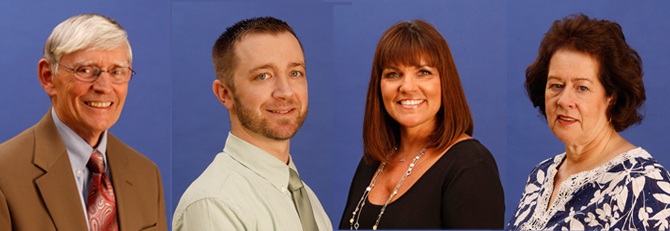
Dr. Rick Barlett finds the most rewarding part of his job is to watch his students go on to complete
four-year degrees and excel in careers. He believes that peer teaching among students
is very valuable, and he uses student teams that culminate in a group presentation
to teach them to interact, share ideas, and lead. His students call him “informative,
easy to talk to, knowledgeable, inclusive, and wise.”
“Rick is a popular instructor who takes time to create interesting presentations and activities for his students,” says his Chair Carmen Daniels. “He is an empathetic and compassionate instructor whose enthusiasm for the content and the profession of teaching is apparent.” As one of the founding faculty members at the Delaware Campus in 2010, Bartlett was able to work with his Chair, the Dean of the Delaware Campus, members of the community, Ohio State Marion faculty, and the Delaware Campus Faculty Committee.
As a member of the Starfish program and the FOCUS Group advisory Board, he worked on student retention in entry-level classes at Delaware, and he also got involved with community activities such as the People In Need program in Delaware County and Toys for Tots. In 2012, he taught the COLS 1100 orientation class, adapting it to the Delaware Campus students.
Best of all, Dr. Rick Bartlett “makes class fun and interactive,” say his students. “I really enjoyed the class,” said another, “I found it very fun and challenging precisely because it was taught by YOU!”
Eric Kenz – Instructor in Biological Sciences
One word appears over and over on Eric Kenz’s Student Evaluations of his Human Anatomy class: Passionate. “He knows what he’s talking
about and is very passionate about it,” says one. “He really cares if you understand
and do well and he is passionate about the material,” says another.
“Eric has devised—somehow, someway—to make learning this extremely in-depth, enormous amount of material manageable!” wrote one student. “Many professors are geniuses, but few are great teachers as well!”
“His is the best online course, hands down!” says another student. “This was one of the hardest classes I have ever had to take and yet became one of the easiest due to the layout of the materials, the virtual lectures and labs, the study guides, and the utmost professionalism of the instructor.”
Observers in his classroom say that Eric “has the demeanor of a master professor well beyond his years. He is thoroughly immersed in all aspects of the anatomy curriculum, and his enthusiasm and clarity are very much valued by his students and colleagues alike.” And finally, Chairperson Michael Hailu says that Eric is one of the best instructors in the department, with outstanding teaching abilities and professional talents. After watching him work with students during office hours and hearing students praise his teaching, he concludes that “Eric is a very smart and humble educator!”
Beth Barnett – Professor in Developmental Education
At the end of each term, Beth Barnett’s email is filled with notes from her students, offering virtual hugs, promises of
pound cake and sauerkraut balls, and heartfelt expressions of gratitude. And these
are from students who absolutely dreaded taking her class…or any math class at the
college. Some of her student evaluations state simply that she is “perfect” at everything.
Others go on and on about how Beth’s class was the first time they understood math,
could do the math…and even loved math! “I’ve taken this class four times,” offered
one student. “This was the first time I didn’t stress out about it every day and I
finally understood everything.” Others put it more bluntly, saying “if you can’t learn
from Ms. Barnett, you can’t learn from no one!”
Beth took the lead role in developing the new Math 1099-Bridge to College Math class, and it couldn’t have been in better hands. The class is a modularized, self-paced format that allows students to advance into college math more quickly by completing one, two, three or even four sets of modules in a semester. The success rate of students in 1099 has been much higher than those in traditional classes. In whatever class she is teaching, Beth strives to convey that the student’s success is her no. 1 priority.
While she acknowledges that mathematics is a thing of value and beauty, it is not the heart of her job. The heart is her connection with each and every student who joins her class.
Fauna Stout – Assistant Professor, Medical Assisting Technology
Fauna Stout’s teaching philosophy is simple: Be FIRM, be FAIR, and show them that you care!”
She wants her students to learn professionalism, understand that she will treat them each with respect, and learn to believe in themselves. Her students agree, saying “Ms. Stout is funny and makes class entertaining. She sticks to what she says, and is fair to everybody.” They also say “I like the fact that she sticks to her rules and policies 100%. If you don’t do the work, you don’t get the grade, which is very important in the medical field!”
Fauna’s Chairperson Connie Grossman says that she is “an asset to the college, division, department and to the chair. With great determination and fortitude she has succeeded in accomplishing her dream to start a Medical Assisting program at the Delaware Campus, and completed the massive accreditation documentation for S2S and the new site.”
But new campuses, semester conversions and accreditation documents aside, what really matters to Fauna is contributing to the success of her students in the classroom and in their careers. And a quick glance through the multitude of cards, emails and letters from her students, and notes from their new employers reveal just how much she is appreciated for doing just that!
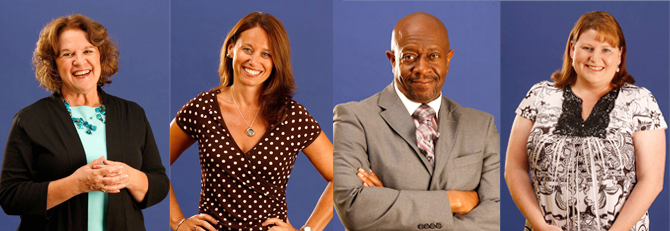
Providing a comfortable and friendly atmosphere in which to learn the complicated skills necessary to sign and interpret is Christine Evenson’s specialty. Classroom observers note that she provides a relaxed but focused atmosphere, using humor to illustrate points and allow students to enjoy themselves. Her students put it more simply, saying that she is “awesome and very nice, and that she makes linguistics fun!” They write that she has the gift of teaching, is never condescending and makes every student feel valuable. Evenson manages to teach, advise, coordinate the Interpreting program, and cover for other faculty when needed, such as during Summer terms. She is active and involved in the Columbus State community, was well as the deaf community. According to her chairperson, “she is clearly an experienced, confident and skilled professor, whose classroom and personal orientation is very student centered.”
Merideth Sellars' goal in the classroom is to put some HEART into her students’ learning of the biological sciences. She compares the “spark” of learning to the automatic beating of a heart—it should be something that students do automatically, without outside stimulation. Her colleagues note that she seamlessly links hands-on labs to lectures, in order to address different learning styles among her students, but her glowing student evaluations are more straightforward, saying that Sellars is thorough and clear, enthusiastic and approachable, knowledgeable and just plain fun. Sellars works continuously to improve student learning in her anatomy and physiology classes. She led the implementation of the CONNECT program which allows students to review difficult concepts through interactive learning on Blackboard. She records her lectures for students to review. She participates in the Choose Ohio First scholarship program and the STEM Club, as well as sharing her specialized Blackboard sites with her colleagues in the Biological Sciences. As one of her nominators wrote: “Merideth clearly demonstrates exemplary commitment to education, to the success of our students, and to Columbus State as an institution.”
As the senior faculty member in the Business Management Department, associate professor Reuel Barksdale serves as a mentor and role model to both students and colleagues. This popular professor’s strengths are in the classroom, where he creates a supportive and encouraging learning environment. Evaluation after evaluation simply state that he is “awesome.” Nearly every student mentions that he is “the best professor” they’ve had at Columbus State, bar none. Beyond the classroom, Reuel’s forte is in community service, where he represents the college with integrity and much-needed expertise. Those observing his classroom find him to be interesting and thought-provoking;--working hard to gain his students’ trust and making each one into an active participant in the class. Reuel says that there are two greatest moments in life: the moment that you were born, and the moment you realize WHY you were born. For Reuel Barksdale, this second moment was when he started his teaching career at Columbus State 14 years ago.
Going to great lengths to explain algebra, including singing about it, is what makes Jennifer Dragoo stand out in the classroom for her students. The Developmental Education instructor, who became a full-time faculty member last year after teaching as an adjunct for eight years, is positively beloved by her students who enter her classroom apprehensive about math… and leave it full of confidence. There are no “dumb questions” in Jennifer’s classroom. Her polite, enthusiastic and thorough demeanor helps her students change their attitude about a subject they may have found intimidating, confusing, or difficult. She not only “sings” about math—writing simple songs to the tune of nursery rhymes—but also creates mnemonics, rhymes, and acronyms to help her students remember formulas and rules of math. These methods, as well as her gentle patience and perseverance, show her genuine concern for her students and her desire to make a difference in their lives.
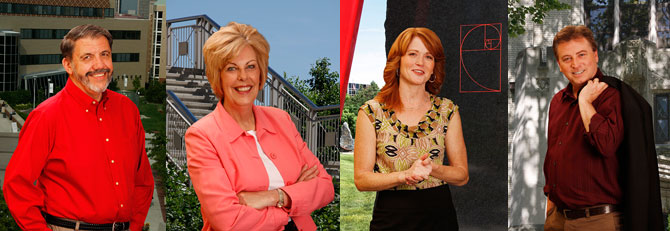
Daniel Chaney is an exemplary member of the Modern Languages Department. He is regularly available
to adjuncts, full-time faculty and administration to assist as needed. Students and
colleagues look for and respect his advice and assistance. He is an extraordinary
instructor and regularly receives praise from his students on the quality of his classes
and the extra support material he develops for them.
The student nominating Daniel wrote: “I want it to be noted that Professor Chaney
is the best instructor I have ever had there! He goes way above and beyond to provide
the best possible learning experience for his students. I was thankful to have this
experience because I am registered with Accessibility Services and really struggle
with learning from teachers sometimes when they do not know how to approach the subject
matter in different ways. Professor Chaney’s class really helped prepare me for the
type of study mechanisms that I need to adopt to succeed at OSU.”
"Professor Chaney," notes his Chairperson Garry Fourman, "was hired in 1990 and has
received the award three times. During the last 10 years he has directed the trip
to Mexico, which has provided a wonderful opportunity for students at Columbus State.
His overall work for the college has been exceptional. "
Connie Clark is an expert in the profession of dental hygiene. Connie Clark started as an adjunct
in the dental hygiene program in 1999. She became the full time clinical coordinator
in 2007, and currently serves as the program coordinator.
She exudes professionalism and challenges students to become the best that they can
be, during their educational experience and as graduates in the profession. One of
her students says of Connie, “Whether she knew it or not, I am sure she was BORN an
educator. She has the ability to see a flicker of light in a student about a subject
and turn it into raging fire with her passion.”
Connie stays current in the fields of dental hygiene and education and is an active
member of dental hygiene professional organizations. She researches and utilizes new
technology in education and provides interactive learning opportunities in both lecture
and lab. She is often in her office advising students or helping them meet their goals
in her courses or in the program. Her chairperson, Connie Grossman, says “she mentors
and provides excellent role modeling as she welcomes students at professional continuing
education courses or meetings. I appreciate her commitment to the students, program,
department, division, and college.”
Amy Hatfield has been a member of the Columbus State Community College Mathematics Department
for several years as an adjunct faculty member and is in her inaugural year as an
Instructor. Amy’s transition to becoming a full-time employee is a strong testament
to her dedication to CSCC and her excellence within the classroom.
Amy has a sustained history of excellence (and perfection in many instances) on student
evaluations. Amy has great empathy towards her students; and long before she was hired
full-time she voluntarily held office hours for her students. A student said of her,
“Professor Hatfield cares about all of her students as individuals and will work to
help all of her students succeed. There is no doubt in my mind that I would not have
understood calculus as well as I have without Hatfield as my instructor. She is without
a doubt the best math instructor I have ever had, and the best instructor I have come
across at Columbus State.”
A few lesser known facts about Amy are that: she has a patent, she had a perfect 4.0
GPA in her graduate program in mathematics, and she's an excellent mother. All three
of these qualities are reflected in her daily classroom instruction. She incorporates
real-world examples into her courses, she pays close attention to details, and she
exhibits great compassion towards her students.
“Amy’s Distinguished Teaching Award, says her chairperson, Jonathan Baker, “is consistent
with my fundamental belief that she is an instructor whose practices merit imitation
by both full-time and adjunct faculty.”
Frank Barnhart has been a member of the Central Ohio theatre community for over 25 years, serving
as an actor, director, administrator and professor. He is the Executive Director of
Actors’ Theatre and he was also recently named “Best Director of the Year” by the
Central Ohio Critics Circle for his production of Company at Gallery Players. In the
more than eight years that Frank has been at Columbus State, he’s directed eleven
plays including the upcoming Spring 2011 production of Reckless; and most notably
The Laramie Project, The Triangle Factory Fire Project, and The Shape of Things¸ receiving
for each of these the Central Ohio Theatre Roundtable Award for Excellence in Directing.
As an invaluable faculty member of the theatre program, Frank has shaped the Fundamentals
of Acting course, more than tripling the enrollment; he also created the advanced
acting course.
Frank is a beloved colleague in the Communication Department and is adored by his
students as reflected in one of his nominations: “Frank's teaching style is the best
I have seen in a teacher. He not only helps a student learn but likes for them to
have fun while doing so. He connects with his students, he doesn't just lecture to
them. He makes it fun, and enjoyable to come to class. His classes are the only ones
that I hate to miss, and rarely do. He brings an excitement and passion with him for
teaching, and it is transferred to his students. He is a phenomenal teacher.”
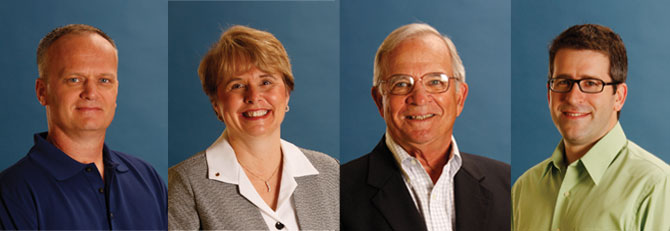
Bert Vonderahe first came to the Landscape Program as a student. After an entire career in corporate America he made the decision to pursue a degree in Landscape Design in order to begin a business of his own. Several years after his graduation Bert expressed an interest in teaching the beginning design course, which does not require the faculty to hold a licence in Landscape Architecture, and with our growing need for faculty with a flexible schedule we gave him a shot. We certainly made the right decision! Bert not only taught our basic design courses but was one of the adjunct team that modified the course and improved it's content. His enthusiasm is catchy and the students acknowledge this by their constant complements to Bert's classroom abilities. He has been a real supporter of our student organization and has given his own time to coach and accompany students to our national competitions in states like Georgia and even as far away as Utah and California. Berts latest contribution to our program was in the development and subsequent instruction of our Homeowner class. This course is a great success and a tribute to Berts professionalism and his commitment to education as a life long experience. The student now teacher, Bert Vonderahe.
Tina Berry joined the college in Autumn of 2006 and recently received tenure and promotion to Assistant Professor. She has taught nursing laboratory skills classes and assessment courses, and clinicals in obstetrics and medical-surgical nursing. Her areas of expertise are Obstetrics, medical-surgical nursing, and quality improvement. She has a joint MSN/MBA degree and is currently working on a PhD in Nursing Education. She has served the college as the Team Leader for the Faculty Collaboration AQIP team, as a Supplemental Instruction Leader, and is hoping to work to further the implementation of Supplemental Instruction in areas around campus. Students say that "Tina is always there with a hug when you need it, encouragement when you need that, and to set you straight when you are wrong and need that too! She is a fantastic role model and the department should be very proud to have her on staff because if we turn out to be like her, then this program is going to turn out some of the best nurses that I have ever seen". "Thanks for all of your hard work. I am not exactly sure how you do it, but in spite of all you have to do, the many directions in which you are pulled, each student you are with is given your full attention with amazing patience. Thank you."
Dr. Adam Keller has been a full-time faculty member at CSCC since 2007. He primarily teaches the Organic Chemistry lecture and laboratory courses. He is very active conducting undergraduate research in organic Chemistry, where he advises 2-4 students a quarter. Adam also conducts novel research learning modules in the classroom, which is funded by the NSF REEL project, where CSCC students work collaboratively with 4-year institutions such as The Ohio State University and Otterbein College. Yet Adam still finds time to actively serve on the college's Shared Governance Instructional Council and the Arts and Sciences Grade Grievance Committee. Adam is known for his dedication to student engagement and success and receives outstanding praise from his laboratory and lecture students each quarter.
John Wallace, for the past 13 years, has taught mathematics in the Developmental Education Department. With a passion for technology, he created exemplary PowerPoint Presentations and instructional voiceovers to assist students with additional learning as they click through previous lectures or various topics. John has created an interactive classroom conducive for learning mathematics. According to John, the videos allow students to watch me work the problem out for them and highlight certain problem areas and areas of importance. His students have expressed how the interactive classroom made mathematics enjoyable and attainable. They have an opportunity to work on their own yet receive John’s guidance at the same time. John’s student evaluations demonstrate his dedication, and his classroom observations are engaging. In addition to his full-time teaching duties, John created the department’s first hybrid math section, a combination of online and “face to face” course work. What an accomplishment! John is truly a distinguished teacher.
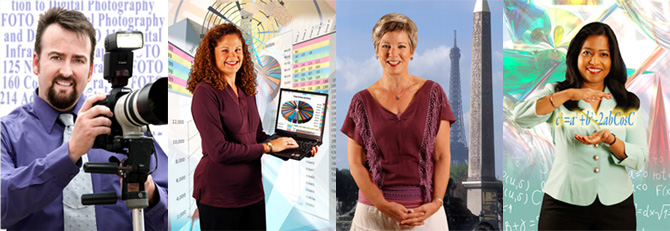
The 2008 Distinguished Teaching Award winners are (from left to right): Gene Strickland, Instructor/Coordinator in Integrated Media and Technology; Leslie Smith, Professor in Mathematics; Julie Molnar, Professor in Modern Languages; Sudha Kolathu Parambil, Adjunct Faculty member in Mathematics.
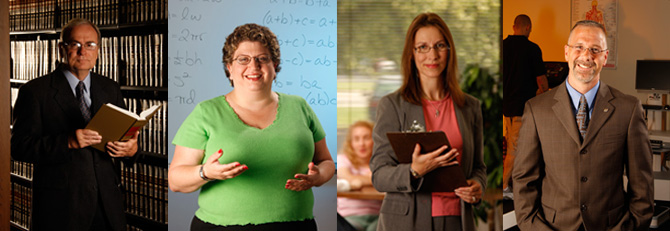
The 2007 Distinguished Teaching Award winners are, from left to right: Dr. Tom Shanahan, Professor in Paralegal Studies; Susan Rosh, Adjunct Instructor in Mathematics; Mary Lewis, Adjunct Instructor in the Social and Behavioral Studies; and Dr. Tom Habegger, Professor in Sports and Exercise Studies.
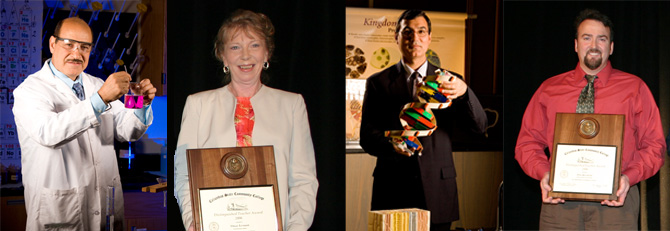
The 2006 Distinguished Teaching Award winners are, from left to right: Tony Hage, Adjunct Instructor in Biological and Physical Sciences; Vivian Lermonde, Adjunct Instructor in Communication Skills; Suresh Pal, Adjunct Instructor in Biological and Physical Sciences; and Gene Strickland, Adjunct Instructor in Graphic Communications.
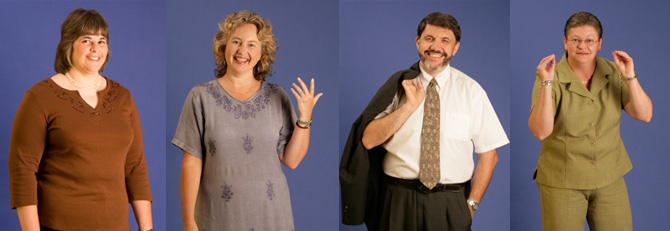
The 2005 Distinguished Teaching Award winners are, from left to right: Cathy Bill, Adjunct Instructor in Biological and Physical Sciences; Melanie Adams, Adjunct Instructor in Early Childhood Development; Daniel Chaney, Professor in Modern Languages; and Lori Woods, Adjunct Instructor in Interpreting and Transliterating.
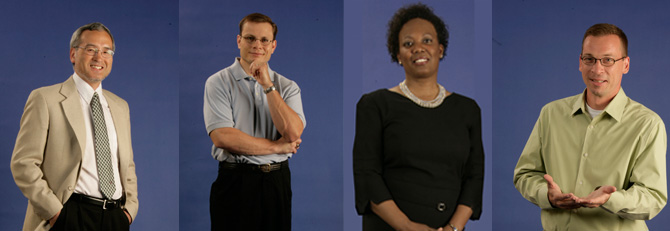
The 2004 Distinguished Teaching Award winners are, from left to right: Dr. Myung Han, Instructor in Biological and Physical Sciences; Philip MacLean, Assistant Professor of Mathematics; Dr. Marilyn Howard, Assistant Professor in Social and Behavioral Sciences (and a graduate of Columbus State); and Terry Eisele, Instructor in Modern Languages.
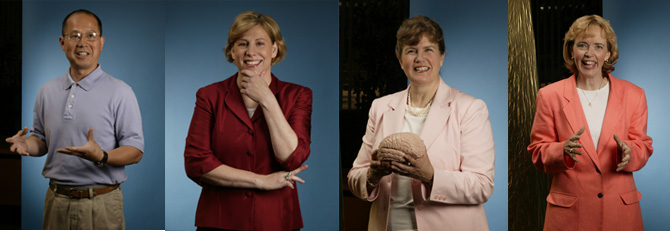
The 2003 Distinguished Teaching Award winners are, from left to right:Tzu-Yi Alan Yang, professor in Mathematics; Ann Palazzo, Associate Professor, Communication Skills; Betsy Nichols, Adjunct in Psyhcology; and Sue Longenbaker, Faculty, Biological Sciences.
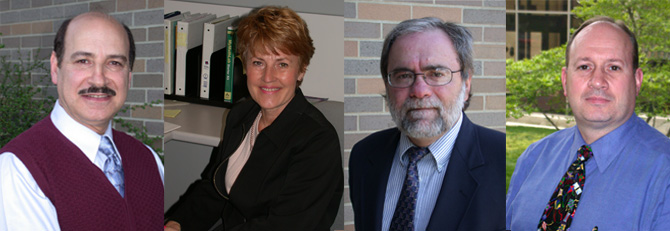
The 2002 Distinguished Teaching Award winners are, from left to right: Dr. Tony Hage, Adjunct Instructor in Chemistry; Pat Rowe, Faculty, Developmental Education; Tom Shanahan, J.D., Professor in Legal Assisting; and Richard Ansley, Professor in Landscape Design/Build.
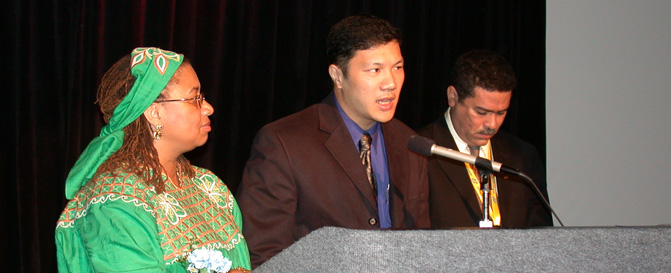
The 2001 Distinguished Teaching Award winners are, from left to right: Loraine Boyd, Professor in Nursing; Karsten Look, Associate Professor of Psychology; Gilberto Serrano, Professor in Modern Languages; and Cystal Clark (not pictured), Professor, Communication Skills.
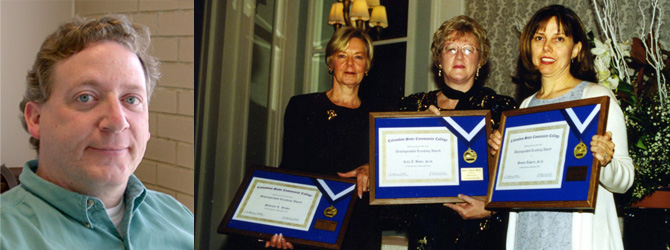
The 2000 Distinguished Teaching Award winners are, from left to right: Darrell Minor, Professor in Mathematics; Patricia Archer, Adjunct Faculty in Mathematics; Rita Bova, Professor in Communication Skills; and Susan Rogers, Associate Professor in Psychology.
1999
Julie Dudas, Adjunct Instructor, Medical Laboratory Technology
Tony Hage, Adjunct Instructor in Chemistry
Julie Molnar, Professor in Modern Languages
Pamela Noreault, Instructor Communication Skills
1998
Tom Habegger, Assistant Professor, Sports & Fitness Management Technology
Michael Hailu, Instructor, Chemistry
Brenda Johnson, Instructor, Veterinary Technology
Daniel Wyatt, Instructor, Accounting & Financial Management Technology
1997
Charles Finley, Professor, Graphics Communication
Samir Gharbo, Adjunct Faculty, Physical Sciences
Tony Hage, Adjunct Faculty, Biological & Physical Sciences
Marilyn Howard, Assistant Professor, Social and Behavioral Sciences
Gene Singleton, Communication Skills
1996
Gene Singleton, Communication
Les Helms, Business Programs
Brenda Chaney, Sociology
Omar Alomari, Humanities
1995
Julie Molnar, Modern Languages
Jane McDowell, Business Programs
Tony Hage, Biological & Physical Sciences
Marilyn Pramschufer, Human Services
1994
Steve O'Neil, Landscape Design
Karen Muir, Social Sciences
Tom Habegger, Sports & Fitness Management Technology
Jerry McDonald,
Department
Employee Engagement and Belonging
Contact
Nick Hardin
Senior Director
(614) 287-2575